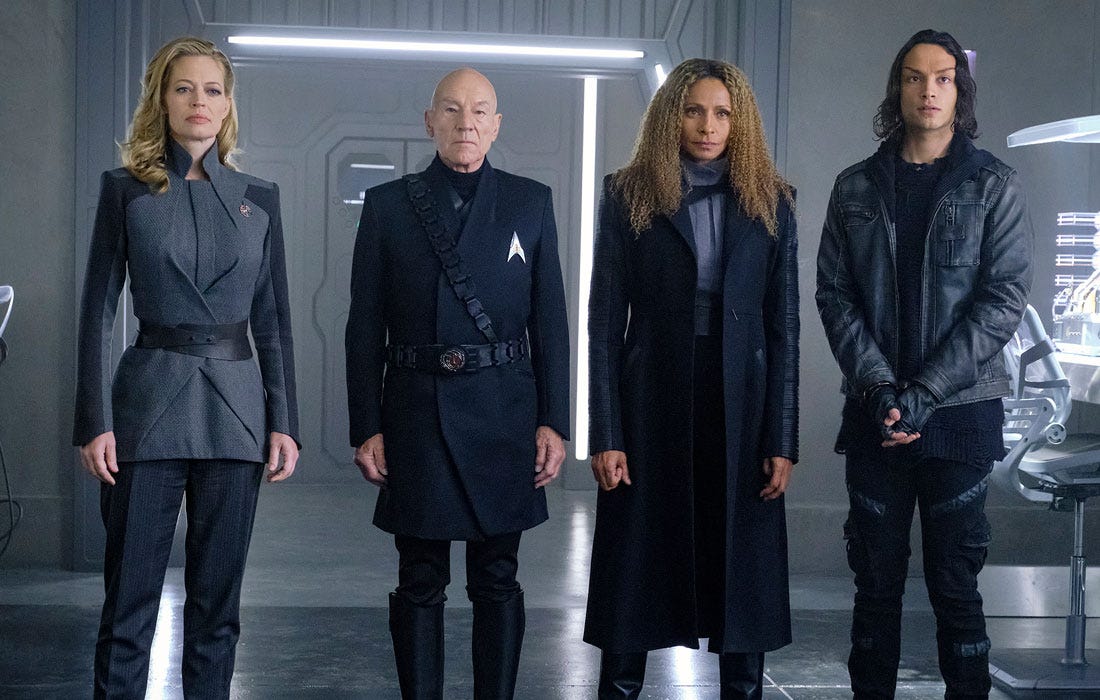My Look at "Star Trek: Picard," Thus Far, or Am I Existing in Some Alternate Universe?
Others have sharply panned what I see as some of the best work of the franchise
Editor's Note: This is something of a special edition of Subspace Chatter. We only just published our previous edition last Thursday — and publication probably won't be quite so prolific. However, we wanted to get this out ahead of this week's season finale of Star Trek: Picard.
I realize that, at the penultimate episode of the season, might be an odd time to stop and take stock of the second season of Star Trek: Picard.
And, yet, maybe it's the perfect time to look at the sweep of the season, and how our somewhat motley, but intrepid, crew got from there to here — right before they come back for one last hour to put it all together and ultimately save the timeline, and the galaxy.
But, frankly, I have another motive as well, and it's this. I'm really — swear to the Great Bird of the Galaxy — starting to feel like this guy…
That's Captain Kirk, in the episode, “The Tholian Web,” when he is initially presumed dead yet actually alive and living in some other phase of reality.
And I guess that's how I feel: like I’m caught out-of-phase from the rest of reality, where other fans — fans who I like, enjoy, and even often agree with — have consistently panned Season 2 of Star Trek: Picard as a creative failure.
Examples of such disdain abound. You probably need only scroll through the comments on your favorite Trek fansite — or at most, at the trusty Googler machine — to find them.
But I think that YouTuber Steve Shives is pretty representative of this phenomenon.
I don't really know Steve, per se, other than I happen to comment on his videos, from time to time, and that he lives at the other end of the state of Maryland.
But, based on his content, I like Steve — and I agree with him far more than I disagree with him.
So that when he talks about Season 2 of Picard and not only says “In my opinion, it's not good,” but goes on to add, “I would say that it's the worst season of any Star Trek show I have ever seen,” I start to try to see if I’m passing through walls as if maybe I’m out of phase like “Tholian Web” Captain Kirk, or if my friends have started sprouting beards where they hadn't been before or begun baring their midriffs.
(I'm talking, of course, about the Mirror Universe first seen in the original series episode, “Mirror, Mirror.” Did I somehow wake up there? After all, that's where all the people turn mean, so maybe that's it. No? You don't think so? Neither do I.)
But, still.
Here's Steve's most-complete and up-to-date commentary on the current season of Star Trek: Picard:
After I watch Steve — and others like him — absolutely savage the series, I'm still left asking, “Have we even been watching the same TV show?”
Bring on the tears
Except for a few select episodes across the history of the franchise — think original series episode, “City on the Edge of Forever,” The Next Generation's “Inner Light,” Deep Space Nine’s “The Visitor,” “Far Beyond the Stars,” and “It’s Only A Paper Moon” — Star Trek's never been where I go to in sci-fi to expect a good cry.
For me, Doctor Who fills that role. There are literally too many Doctor Who episodes where, by the end, I am left a blubbering heap of tears, snot and balled-up tissues.
But, again, Star Trek — as much as it's my first love in the genre — just doesn't have that same effect, save for those aforementioned episodes.
Even Season 1 of Star Trek: Picard — I cried more than I had consistently in any other single season of Star Trek — but even then, it was limited to specific, discrete episodes. It was “Nepenthe,” Jean-Luc's reunion with Will and Deanna, and the season finale episodes in which we experience — along with Jean-Luc — Data’s desire to die and Picard's assent to carry out that wish; as well as then Jean-Luc's own death as human being before rising again as a synthetic lifeform.
Yes, admittedly I’m prone to tears, and I equate the ability to evoke those tears as proof that a given episode or story is written in a strong and impactful way. Because whilst I know that can cry a lot, it takes a lot for a work of fiction to elicit that response, because I know that it's not actually real.
So, fast-forward to Season 2. I learned early on — from the very first episodes — that a box of tissues was going to have to be my new accessory for every Thursday I tuned in to the latest adventures.
Just this last week, watching Episode 9, “Hide And Seek,” as soon as we saw Agnes still in there — not yet fully assimilated and fighting back against the Borg Queen with everything she had — the tears began to flow.
And the moment Hologram Elnor appeared, I was simultaneously sobbing at the joy of seeing Elnor again — and exultant as my absolute favorite Qowat Milat began kicking Borg ass.
That's a huge payoff for the emotional investment in the series. It's that ability to elicit such strong reactions from an audience to which every drama — and every story — ought to aspire.
And honestly, that's the kind of emotional payoff which I have really only before most ascribed to Doctor Who.
Where others saw stilted writing and boring plots, I saw a story which was at turns heartrending — the revelations of Jean-Luc's childhood and family life — and lighthearted, such as the hilarious and on-point scene in Episode 4, “The Watcher,” bringing back a new cameo of Kirk Thatcher, as the loud punk on the city bus.
It was the perfect nod to fans, acknowledging that this season has been an echo of the time travel story from Star Trek IV: The Voyage Home, otherwise known as “The One With the Whales.”

The only “thumbs down,” that I would really give this season would be Episode 8, “Mercy.”
To be honest, I found it slow and deadly dull. You know those few minutes in a typical Star Trek episode — or any hour drama, really — usually not long after the half-hour mark when things slow down, mostly to start wrapping up loose ends and exposition to carry the viewers to the ultimate climax?
Well, “Mercy” were those few minutes from any other drama and elongated to a full hour to stand on its own. And it just didn't work.
A true ensemble
Something else that really impressed me with Season 2 is that, this season, our crew has been a true ensemble — a true team.
Last season seemed like it was Jean-Luc and Soji's (Isa Briones) show, and everyone else were supporting cast.
But this year?
Not only has everyone had something to do, they've all had their stories told.
This is something that I've actually been really impressed with by Star Trek: Picard Season 2, particularly when held up against its contemporary sister series on Paramount+.
These series all have much more truncated seasons than Trek of the past: usually half as many episodes as compared to, say, The Next Generation, or Deep Space Nine.
One glaring effect this has had — particularly in terms of Star Trek: Picard's sister series, Star Trek: Discovery — has been much more curtailed development of secondary and supporting characters.
This season, especially, Star Trek: Picard has very much avoided this trap. Whilst, yes, the main focus has been on Picard — well, the series is named for him, so what do expect? — the others all have had moments, or even little arcs, which have allowed us to know each one better as unique individuals.
Nowhere has this been more evident than the wonderful decision to hire the brilliant Ito Aghayere as the 21st century Guinan.
She recently had a fascinating conversation with Wil Wheaton, host of Paramount+'s Ready Room program describing how she created her version of the character originated by Whoopi Goldberg and whom we've known and loved since some of the earliest days of The Next Generation.
And, quite frankly, at this point I really prefer Aghayere's take on Guinan. Whilst much loved, Goldberg's Guinan could often be a bit of a one-note: the empathetic but snappy-talking bartender with a dash of mysterious mysticism.
Aghayere, however, has really fleshed out who Guinan is in so many new ways, I know that I’m going to want to see more.
Mars vs Venus
Star Trek: Picard, this season, has mostly focused on Earth, yet I wonder if perhaps some of dissonance I've encountered in reactions on the perceived quality of the storytelling is somehow a “Mars vs Venus” phenomenon.
Different perceptions for men and women.
Because whilst, certainly, there's been a good deal of action — probably the first genuine car chase in Star Trek history! — there's no doubt that this season has really been a story of emotions and self-discovery.
Could it be that Star Trek: Picard Season 2 is the franchise equivalent of a “chick flick?”
I don't know, for sure. Be sure to leave your thoughts in the comments.
What I do know is just how much I have absolutely loved this season of Star Trek: Picard.
Where Steve Shives says, “I would say that it's the worst season of any Star Trek show I have ever seen,” I would proclaim it to be — if not the best — certainly among the very best in Star Trek history.
Before we go, though, here's a quick click:
PREVIEW: Star Trek: Picard - Season Two Finale
Enjoy this edition of Subspace Chatter?
Please make sure you …
And also …








You really need to raise your standards.